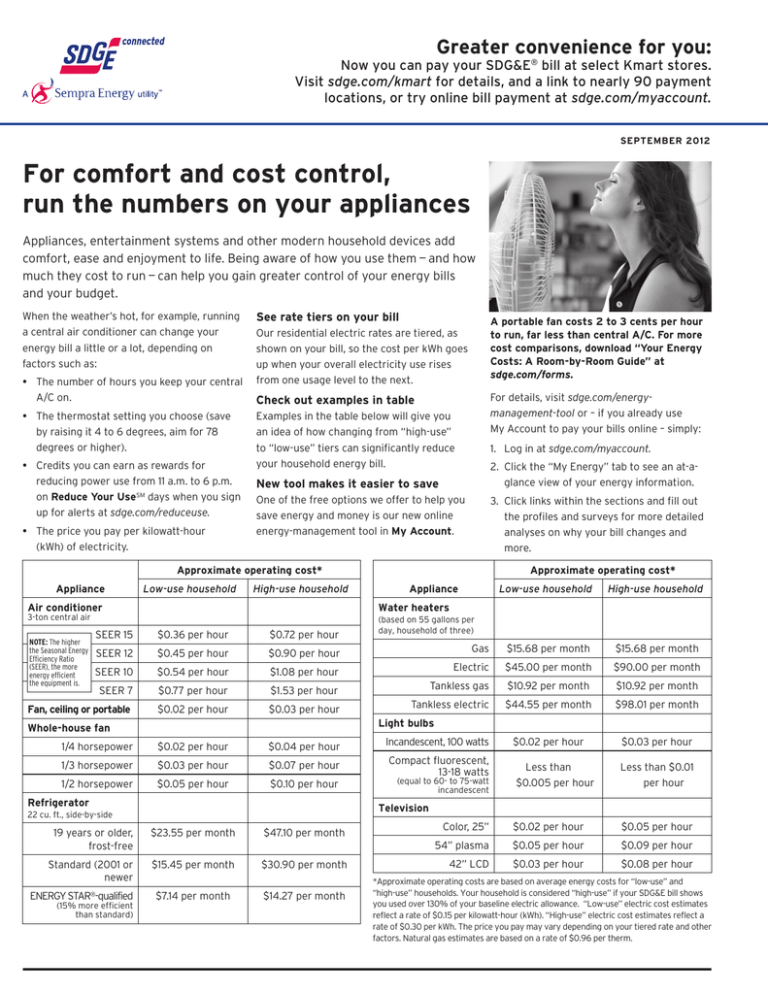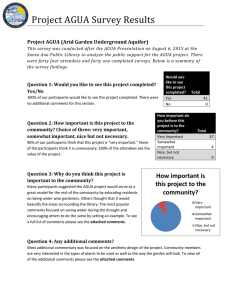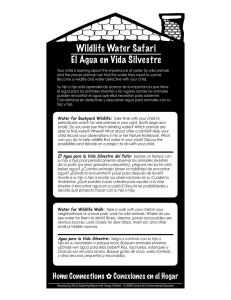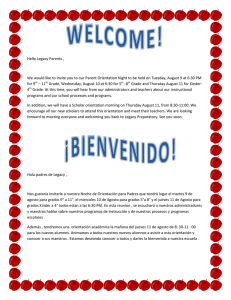For comfort and cost control, run the numbers on your appliances
Anuncio

Greater convenience for you: Now you can pay your SDG&E® bill at select Kmart stores. Visit sdge.com/kmart for details, and a link to nearly 90 payment locations, or try online bill payment at sdge.com/myaccount. SEPTEMBER 2012 For comfort and cost control, run the numbers on your appliances Appliances, entertainment systems and other modern household devices add comfort, ease and enjoyment to life. Being aware of how you use them — and how much they cost to run — can help you gain greater control of your energy bills and your budget. When the weather’s hot, for example, running a central air conditioner can change your energy bill a little or a lot, depending on factors such as: • The number of hours you keep your central A/C on. • The thermostat setting you choose (save by raising it 4 to 6 degrees, aim for 78 degrees or higher). • Credits you can earn as rewards for reducing power use from 11 a.m. to 6 p.m. on Reduce Your UseSM days when you sign up for alerts at sdge.com/reduceuse. • The price you pay per kilowatt-hour (kWh) of electricity. See rate tiers on your bill A portable fan costs 2 to 3 cents per hour to run, far less than central A/C. For more cost comparisons, download “Your Energy Costs: A Room-by-Room Guide” at sdge.com/forms. Our residential electric rates are tiered, as shown on your bill, so the cost per kWh goes up when your overall electricity use rises from one usage level to the next. For details, visit sdge.com/energymanagement-tool or – if you already use My Account to pay your bills online – simply: Check out examples in table Examples in the table below will give you an idea of how changing from “high-use” to “low-use” tiers can significantly reduce your household energy bill. 1. Log in at sdge.com/myaccount. 2. Click the “My Energy” tab to see an at-aglance view of your energy information. New tool makes it easier to save One of the free options we offer to help you save energy and money is our new online energy-management tool in My Account. 3. Click links within the sections and fill out the profiles and surveys for more detailed analyses on why your bill changes and more. Approximate operating cost* Appliance Low-use household High-use household Air conditioner Low-use household Appliance High-use household Water heaters 3-ton central air NOTE: The higher the Seasonal Energy Efficiency Ratio (SEER), the more energy efficient the equipment is. Approximate operating cost* (based on 55 gallons per day, household of three) SEER 15 $0.36 per hour $0.72 per hour SEER 12 $0.45 per hour $0.90 per hour Gas $15.68 per month $15.68 per month $45.00 per month $90.00 per month SEER 10 $0.54 per hour $1.08 per hour Electric SEER 7 $0.77 per hour $1.53 per hour Tankless gas $10.92 per month $10.92 per month Fan, ceiling or portable $0.02 per hour $0.03 per hour Tankless electric $44.55 per month $98.01 per month $0.02 per hour $0.03 per hour Less than $0.005 per hour Less than $0.01 per hour Color, 25” $0.02 per hour $0.05 per hour 54” plasma $0.05 per hour $0.09 per hour 42” LCD $0.03 per hour $0.08 per hour Light bulbs Whole-house fan 1/4 horsepower $0.02 per hour $0.04 per hour Incandescent, 100 watts 1/3 horsepower $0.03 per hour $0.07 per hour Compact fluorescent, 13-18 watts 1/2 horsepower $0.05 per hour $0.10 per hour Refrigerator Television 22 cu. ft., side-by-side 19 years or older, frost-free Standard (2001 or newer ENERGY STAR®-qualified (15% more efficient than standard) (equal to 60- to 75-watt incandescent $23.55 per month $47.10 per month $15.45 per month $30.90 per month $7.14 per month $14.27 per month *Approximate operating costs are based on average energy costs for “low-use” and “high-use” households. Your household is considered “high-use” if your SDG&E bill shows you used over 130% of your baseline electric allowance. “Low-use” electric cost estimates reflect a rate of $0.15 per kilowatt-hour (kWh). “High-use” electric cost estimates reflect a rate of $0.30 per kWh. The price you pay may vary depending on your tiered rate and other factors. Natural gas estimates are based on a rate of $0.96 per therm. Book your annual checkup today. We offer free safety checkups on gas furnaces for our gas customers. To schedule, call 1-800-411-7343 or visit sdge.com/serviceorder, and have your SDG&E® account number handy. Make sure your furnace is ready to go before cold weather arrives. Tips on tap: Water heater safety and savings Here are some simple steps to keep safety and energy savings on tap year-round with your water heater. • Set your water heater thermostat to 120 degrees or less. Lowering the thermostat by just 10 degrees can save 3% to 5% in energy costs, and reduces the risk of scalding. (A setting of 140 degrees may be necessary, however, for certain health reasons or if your dishwasher doesn’t have a booster heater.) • Since thermostat settings aren’t always accurate, check the temperature by placing a thermometer under a faucet and running the water. A range of 110-115 degrees is typical for showering and hand washing, and 100 degrees or less for a child’s bath water. Tap water can burn skin in as little as 90 seconds at 125 degrees, 30 seconds at 130 degrees, 10 seconds at 135 degrees, and 5 seconds at 140 degrees. • Fix leaky faucets. As heated water drips away, cold water enters the water heater at the same rate. • Use cold water to wash clothes and rinse dishes when possible. • Run full loads in the clothes washer and dishwasher. • Install low-flow devices on faucets and showerheads – less water, less heating. • Get a rebate of up to $75 when you buy a qualifying energy-efficient water heater. Apply at sdge.com/rebates. NOTE: Energy-efficiency programs are funded by California utility customers and administered by SDG&E under the auspices of the California Public Utilities Commission. Seguridad y ahorro con el calentador de agua He aquí unas sencillas sugerencias para mantener la seguridad y ahorrar energía todo el año con su calentador de agua. • Ponga el termostato del calentador de agua a 120 grados o menos. Bajándole al termostato tan sólo 10 grados puede ahorrar de 3% a 5% en costos de energía, y reduce el riesgo de escaldaduras. (Sin embargo, tal vez sea necesario ponerlo a 140 grados, por ciertas razones de salud o si su lavaplatos no tiene un calentador de refuerzo). • Dado que los ajustes del termostato no siempre son precisos, revise la temperatura colocando un termómetro bajo una llave y abriendo el agua. Un rango de 110 a 115 grados es lo normal para ducharse y lavarse las manos, y 100 grados o menos para el agua de baño de un niño. El agua de la llave puede quemar la piel en tan sólo 90 segundos cuando está a 125 grados, en 30 segundos a 130 grados, en 10 segundos a 135 grados, y en 5 segundos a 140 grados. • Repare las llaves con fugas. En la misma proporción en que se tira el agua caliente al gotear, entra agua fría al calentador de agua. • Use agua fría para lavar la ropa y enjuagar los platos cuando sea posible. • Ponga cargas completas en la lavadora de ropa y la lavaplatos. • Instale dispositivos de bajo flujo en las llaves y los cabezales para regadera — entre menos agua use, menos usará el calentador. • Obtenga un reembolso de hasta $75 cuando compre un calentador de agua eficiente en energía que reúna los requisitos. Solicítelo en sdge.com/rebates. NOTA: Los programas para la eficiencia energética están financiados por los clientes de las empresas de servicios públicos de California y administrados por SDG&E, bajo los auspicios de la Comisión de Servicios Públicos de California. Before bathing children, test the water temperature to prevent scalding accidents. Antes de bañar a los niños, pruebe la temperatura del agua para evitar accidentes por escaldaduras. POWER CONTENT LABEL ENERGY RESOURCES SDG&E 2011 POWER MIX 2011 CA POWER MIX** (Actual) Eligible Renewable - Biomass & waste - Geothermal - Small hydroelectric - Solar - Wind Coal Large Hydroelectric Natural Gas Nuclear Other Unspecified sources of power* Total 15.7% 3.2% 4.4% 0.1% 0.0% 7.9% 2.7% 0.0% 42.8% 20.4% 0.0% 18.4% 100.0% 14.5% 2.2% 4.7% 2.2% 0.4% 5.1% 8.4% 13.4% 36.5% 15.7% 0.0% 11.5% 100.0% *“Unspecified sources of power” means electricity from transactions that are not traceable to specific generation sources. **Percentages are estimated annually by the California Energy Commission based on the electricity sold to California consumers during the previous year. For specific information about this electricity product, contact San Diego Gas & Electric ®. For general information about the Power Content Label, contact the California Energy Commission at 1-800-555-7794 or www.energy.ca.gov/consumer. © 2012 San Diego Gas & Electric Company. All trademarks belong to their respective owners. All rights reserved. Some materials used under license, with all rights reserved by licensor. E Printed on recycled paper. S1210028 0912



